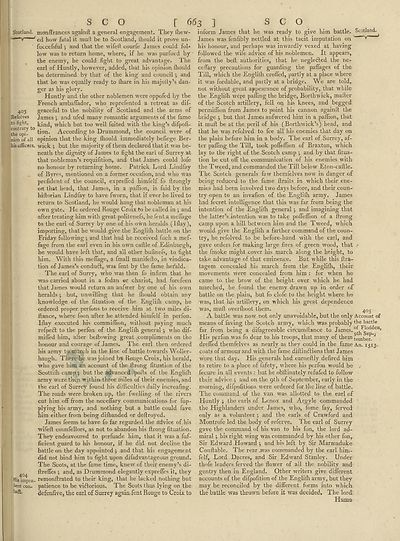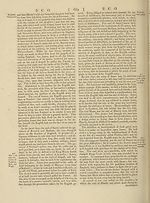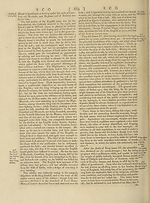Encyclopaedia Britannica, or, a Dictionary of arts, sciences, and miscellaneous literature : enlarged and improved. Illustrated with nearly six hundred engravings > Volume 18, RHI-SCR
(701) Page 663
Download files
Complete book:
Individual page:
Thumbnail gallery: Grid view | List view

SCO
[ 663 ]
SCO
Scotland.
403
Refolves
to fight,
contrary to
the opi-
I nion of all
his officers.
. 4°4
His impru-
' lent con-
luft.
monffrances again ft a general engagement. They (hew¬
ed how fatal it muft be to Scotland, (hould it prove un-
fuccefsful; and that the wifeft eourfe James could foh
low was to return home, where, if he was purfued by
the enemy, he could fight to great advantage. The
earl of Huntly, however, added, that his opinion ftiould
be determined by that of the king' and council ; and
that he was equally ready to (hare in his majefty’s dan¬
ger as his glory.
Huntly and the other noblemen were oppofed by the
French ambaffador, who reprefented a retreat as dif-
graceful to the nobility of Scotland and the arms of
James ; and ufed many romantic arguments of the fame
kind, which but too well fuited with the king’s difpofi-
tion. According to Drummond, the council were of
opinion that the king (hould immediately befiege Ber¬
wick *, but the majority of them declared that it was be¬
neath the dignity of James to fight the earl of Surrey at
that nobleman’s requifition, and that James could lofe
no honour by returning home. Patrick Lord Lindfay
of Byres, mentioned on a lormer occafion, and who was
prefident of the council, exprefled himfelf fo ftrongly
on that head, that James, in a paftion, is faid by the
hiftorian Lindfay to have fworn, that if ever he lived to
return to Scotland, he would hang that nobleman at his
own gate. He ordered Rouge Croix to be called in ; and
after treating him with great politenefs, he fent a meflage
to the earl of Surrey by one of his own heralds (Klay),
importing, that he would give the Englifti battle on the
Friday following; and that had he received fuch a mef-
fage from the earl even in his own caftle of Edinburgh,
he would have left that, and all other bufinefs, to fight
him. With this meflage, a fmall manifefto, in vindica¬
tion of James’s conduct, was fent by the fame herald.
The earl of Surry, who was then fo infirm that he
was carried about in a fedan or chariot, had forefeen
that James would return an anfwer by one of his own
heralds •, but, unwilling that he ftiould obtain any
knowledge of the fituation of the Englifti camp, he
ordered proper perfons to receive him at two miles di-
ftance, where foon after he attended himfelf in perfon.
Iflay executed his commiftion, without paying much
refpeft to the perfon of the Englifti general •, who dif-
mifled him, after bellowing great compliments on the
honour and courage of James. The earl then ordered
his army to march in the line of battle towards Woller-
haugh. There he was joined by Rouge Croix, his herald,
who gave him rfn account of the ftrong fituation of the
Scottifti camp •, but the advanced polls of the Englifti
army were then within three miles of their enemies, and
the earl of Surrey found his difficulties daily increafing.
The roads were broken up, the fwelling of the rivers
cut him off from the neceflary communications for fup-
plying his army, and nothing but a battle could fave
him either from being difbanded or deftroyed.
James feems to have fo far regarded the advice of his
wifeft counfellors, as not to abandon his ftrong fituation.
They endeavoured to perfuade him, that it was a fuf-
ficient guard to his honour, if he did not decline the
battle on the day appointed j and that his engagement
did not bind him to fight upon difadvantageous ground.
The Scots, at the fame time, knew of their enemy’s di-
ftrefles *, and, as Drummond elegantly exprefles it, they
remonftrated to their king, that he lacked nothing but
patience to be victorious. The Scots thus lying on the
defenftve, the earl of Surrey again fent Rouge to Croix to
inform James that he was ready to give him battle. Scotland.
James was fenfibly nettled at this tacit imputation on ' "*
his honour, and perhaps was inwardly vexed at having
followed the wife advice of his noblemen. It appears,
from the bell authorities, that he neglefted the ne-
ceffary precautions for guarding the paflages of the
Till, which the Englifti crofled, partly at a place where
it was fordable, and partly at a bridge. We are told,
not without great appearance of probability, that while
the Englifti were pafling the bridge, Borthwick, mailer
of the Scotch artillery, fell on his knees, and begged
permiflion from James to point his cannon againft the
bridge j but that James anfwered him in a paflion, that
it muft be at the peril of his (Borthwick’s) head, and
that he was refolved to fee all his enemies that day on
the plain before him in a body. The earl of Surrey, af¬
ter pafling the Till, took pofieflion of Braxton, which
lay to the right of the Scotch camp ; and by that fitua¬
tion he cut off the communication of his enemies with
the Tweed, and commanded the Till below Eton-caftle.
The Scotch generals faw themfelves now in danger of
being reduced to the fame (traits in which their ene¬
mies had been involved two days before, and their coun¬
try open to an invafion of the Englifti army. James
had fecret intelligence that this was far from being the
intention of the Englifti general j and imagining that
the latter’s intention was to take pofleffion of a ftrong
camp upon a hill between him and the Tweed, which
would give the Englifti a farther command of the coun¬
try, he refolved to be before-hand with the earl, and
gave orders for making large fires of green wood, that
the fmoke might cover his march along the height, to
take advantage of that eminence. But while this ftra-
tagem concealed his march from the Englifti, their
movements were concealed from him : for when he
came to the brow of the height over which he had
marched, he found the enemy drawn up in order of
battle on the plain, but fo clofe to the height where he
was, that his artillery, on which his great dependence
was, muft overflioot them. ^qj.
A battle was now not only unavoidable, but the only Account of
means of faving the Scotch army, which was probably tfi*2 battle
far from being a difagreeable circumftance to James. 0^,^lotl^en,
His perfon was fo dear to his troops, that many of them tember. *
dreffed themfelves as nearly as they could in the fame An. i5i3«
coats of armour and with the fame diftindlions that James
wore that day. His generals had earneftly defired him
to retire to a place of fafety, where his perfon would be .
fecure in all events : but he obftinately refufed to follow
their advice ; and on the 9U1 of September, early in the
morning, difpofitions were ordered for the line of battle.
The command of the van was allotted to the earl of
Huntly ; the earls of Lenox and Argyle commanded
the Highlanders under James, who, fome fay, ferved
only as a volunteer •, and the earls of Crawford and
Montrofe led the body of referve. The earl of Surrey
gave the command of his van to his fon, the lord ad¬
miral ; his right wing was commanded by his other fon,
Sir Edward Howard •, and his left by Sir Marmaduke
Conftable. The rear .was commanded by the earl him¬
felf, Lord Dacres, and Sir Edw'ard Stanley. Under
thofe leaders ferved the flower of all the nobility and
gentry then in England. Other writers give different
accounts of the difpofition of the Englifti army, but they
may be reconciled by the different forms into which
the battle was thrown before it was decided. The lord
Hums
[ 663 ]
SCO
Scotland.
403
Refolves
to fight,
contrary to
the opi-
I nion of all
his officers.
. 4°4
His impru-
' lent con-
luft.
monffrances again ft a general engagement. They (hew¬
ed how fatal it muft be to Scotland, (hould it prove un-
fuccefsful; and that the wifeft eourfe James could foh
low was to return home, where, if he was purfued by
the enemy, he could fight to great advantage. The
earl of Huntly, however, added, that his opinion ftiould
be determined by that of the king' and council ; and
that he was equally ready to (hare in his majefty’s dan¬
ger as his glory.
Huntly and the other noblemen were oppofed by the
French ambaffador, who reprefented a retreat as dif-
graceful to the nobility of Scotland and the arms of
James ; and ufed many romantic arguments of the fame
kind, which but too well fuited with the king’s difpofi-
tion. According to Drummond, the council were of
opinion that the king (hould immediately befiege Ber¬
wick *, but the majority of them declared that it was be¬
neath the dignity of James to fight the earl of Surrey at
that nobleman’s requifition, and that James could lofe
no honour by returning home. Patrick Lord Lindfay
of Byres, mentioned on a lormer occafion, and who was
prefident of the council, exprefled himfelf fo ftrongly
on that head, that James, in a paftion, is faid by the
hiftorian Lindfay to have fworn, that if ever he lived to
return to Scotland, he would hang that nobleman at his
own gate. He ordered Rouge Croix to be called in ; and
after treating him with great politenefs, he fent a meflage
to the earl of Surrey by one of his own heralds (Klay),
importing, that he would give the Englifti battle on the
Friday following; and that had he received fuch a mef-
fage from the earl even in his own caftle of Edinburgh,
he would have left that, and all other bufinefs, to fight
him. With this meflage, a fmall manifefto, in vindica¬
tion of James’s conduct, was fent by the fame herald.
The earl of Surry, who was then fo infirm that he
was carried about in a fedan or chariot, had forefeen
that James would return an anfwer by one of his own
heralds •, but, unwilling that he ftiould obtain any
knowledge of the fituation of the Englifti camp, he
ordered proper perfons to receive him at two miles di-
ftance, where foon after he attended himfelf in perfon.
Iflay executed his commiftion, without paying much
refpeft to the perfon of the Englifti general •, who dif-
mifled him, after bellowing great compliments on the
honour and courage of James. The earl then ordered
his army to march in the line of battle towards Woller-
haugh. There he was joined by Rouge Croix, his herald,
who gave him rfn account of the ftrong fituation of the
Scottifti camp •, but the advanced polls of the Englifti
army were then within three miles of their enemies, and
the earl of Surrey found his difficulties daily increafing.
The roads were broken up, the fwelling of the rivers
cut him off from the neceflary communications for fup-
plying his army, and nothing but a battle could fave
him either from being difbanded or deftroyed.
James feems to have fo far regarded the advice of his
wifeft counfellors, as not to abandon his ftrong fituation.
They endeavoured to perfuade him, that it was a fuf-
ficient guard to his honour, if he did not decline the
battle on the day appointed j and that his engagement
did not bind him to fight upon difadvantageous ground.
The Scots, at the fame time, knew of their enemy’s di-
ftrefles *, and, as Drummond elegantly exprefles it, they
remonftrated to their king, that he lacked nothing but
patience to be victorious. The Scots thus lying on the
defenftve, the earl of Surrey again fent Rouge to Croix to
inform James that he was ready to give him battle. Scotland.
James was fenfibly nettled at this tacit imputation on ' "*
his honour, and perhaps was inwardly vexed at having
followed the wife advice of his noblemen. It appears,
from the bell authorities, that he neglefted the ne-
ceffary precautions for guarding the paflages of the
Till, which the Englifti crofled, partly at a place where
it was fordable, and partly at a bridge. We are told,
not without great appearance of probability, that while
the Englifti were pafling the bridge, Borthwick, mailer
of the Scotch artillery, fell on his knees, and begged
permiflion from James to point his cannon againft the
bridge j but that James anfwered him in a paflion, that
it muft be at the peril of his (Borthwick’s) head, and
that he was refolved to fee all his enemies that day on
the plain before him in a body. The earl of Surrey, af¬
ter pafling the Till, took pofieflion of Braxton, which
lay to the right of the Scotch camp ; and by that fitua¬
tion he cut off the communication of his enemies with
the Tweed, and commanded the Till below Eton-caftle.
The Scotch generals faw themfelves now in danger of
being reduced to the fame (traits in which their ene¬
mies had been involved two days before, and their coun¬
try open to an invafion of the Englifti army. James
had fecret intelligence that this was far from being the
intention of the Englifti general j and imagining that
the latter’s intention was to take pofleffion of a ftrong
camp upon a hill between him and the Tweed, which
would give the Englifti a farther command of the coun¬
try, he refolved to be before-hand with the earl, and
gave orders for making large fires of green wood, that
the fmoke might cover his march along the height, to
take advantage of that eminence. But while this ftra-
tagem concealed his march from the Englifti, their
movements were concealed from him : for when he
came to the brow of the height over which he had
marched, he found the enemy drawn up in order of
battle on the plain, but fo clofe to the height where he
was, that his artillery, on which his great dependence
was, muft overflioot them. ^qj.
A battle was now not only unavoidable, but the only Account of
means of faving the Scotch army, which was probably tfi*2 battle
far from being a difagreeable circumftance to James. 0^,^lotl^en,
His perfon was fo dear to his troops, that many of them tember. *
dreffed themfelves as nearly as they could in the fame An. i5i3«
coats of armour and with the fame diftindlions that James
wore that day. His generals had earneftly defired him
to retire to a place of fafety, where his perfon would be .
fecure in all events : but he obftinately refufed to follow
their advice ; and on the 9U1 of September, early in the
morning, difpofitions were ordered for the line of battle.
The command of the van was allotted to the earl of
Huntly ; the earls of Lenox and Argyle commanded
the Highlanders under James, who, fome fay, ferved
only as a volunteer •, and the earls of Crawford and
Montrofe led the body of referve. The earl of Surrey
gave the command of his van to his fon, the lord ad¬
miral ; his right wing was commanded by his other fon,
Sir Edward Howard •, and his left by Sir Marmaduke
Conftable. The rear .was commanded by the earl him¬
felf, Lord Dacres, and Sir Edw'ard Stanley. Under
thofe leaders ferved the flower of all the nobility and
gentry then in England. Other writers give different
accounts of the difpofition of the Englifti army, but they
may be reconciled by the different forms into which
the battle was thrown before it was decided. The lord
Hums
Set display mode to:
![]() Universal Viewer |
Universal Viewer | ![]() Mirador |
Large image | Transcription
Mirador |
Large image | Transcription
Images and transcriptions on this page, including medium image downloads, may be used under the Creative Commons Attribution 4.0 International Licence unless otherwise stated. ![]()
| Permanent URL | https://digital.nls.uk/193027820 |
|---|
| Attribution and copyright: |
|
|---|
| Description | Ten editions of 'Encyclopaedia Britannica', issued from 1768-1903, in 231 volumes. Originally issued in 100 weekly parts (3 volumes) between 1768 and 1771 by publishers: Colin Macfarquhar and Andrew Bell (Edinburgh); editor: William Smellie: engraver: Andrew Bell. Expanded editions in the 19th century featured more volumes and contributions from leading experts in their fields. Managed and published in Edinburgh up to the 9th edition (25 volumes, from 1875-1889); the 10th edition (1902-1903) re-issued the 9th edition, with 11 supplementary volumes. |
|---|---|
| Additional NLS resources: |
|

